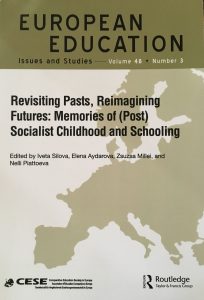Special Issue in European Education 48(3), 2016
Revisiting Pasts, Reimagining Futures: Memories of (Post)Socialist Childhood and Schooling
edited by Iveta Silova, Elena Aydarova, Zsuzsa Millei, Nelli Piattoeva

The call for papers for this special issue stemmed from a desire to both interrupt the persisting prevalence of Cold War narratives and to explore possibilities of alternative historical constructions of schooling and childhoods. The invitation included a call to engage with memories of (post)socialist pasts in order to reexamine the totalizing and monolithic accounts still present in scholarly literature and public imagination in the West (Lemon, 2008). The exploration of pasts from (auto)biographic, autoethnographic, and oral history approaches also offers resources for re-imagining how education and institutional experiences of schooling can be differently conceived, how relationships between participants in educational institutions can be understood in more complex terms, or how constructions of space and childhoods can interact with educational approaches. By re-examining, renarrating, and re-evaluating past experiences, we as historical beings not only hope to open avenues for the articulation of alternative histories but also to find paths toward differently or better understanding the present and to map out futures that are perhaps more just and more equal PDF (305 KB)
“Fairy Tale for Pioneers”: Deconstruction of Official Ideology in Memories About Artek 1960s–1980s by Anna Kozlova
This article focuses on the memories of the Soviet pioneer camp Artek among camp leaders and Pioneers who visited this camp in the 1960s–1980s. The study examines the interaction between the ideology discourse of the late Soviet epoch about Artek and personal autobiographical memories. Turning to analysis of narrative structure and the pragmatic context of the memories, the article describes why Artek may be understood as a nonideological and—in some cases—non-Soviet project. Artek as a private realization of the “general” communist utopian project had features that enabled some people to perceive (and remember) it as an “exception” from the usual Soviet everyday life (distance from the center, exoticization of nature, material world) and, as a consequence, the social world. PDF (297 KB
Memories of the Revolution Childhood and the Modernization Childhood in China: 1950s–1980s by Xiaobei Chen& Lan Chen
This article reflects on the authors’ personal experiences with schooling in China from the 1950s to the 1980s. We discuss socially salient identities at that time period and how these shaped our lives, in schools and outside. Our analytical concern is the disciplining of childhood to align children’s lives with the Party-state’s political goals, especially through the strategy of exemplars. We elaborate on our experiences with processes of constructing the model student in school, the discourse of revolution child heroes in the ideological context of class struggles, and later the discourse of the scientist child helping the modernization cause. The essay concludes with some reflective remarks about the contested remembering of socialist childhoods as a mark of the postsocialist transition in China. PDF (321 KB)
Narrating Surroundings and Suppression: The Role of School in Soviet Childhood Memories by Raili Nugin & Kirsti Jõesalu
The article explores how people born in Estonia in the 1970s contextualize their memories about their Soviet childhood in the context of school. Focusing on small group of people who grew up in the Soviet Estonia, we argue that in biographical narratives, school is treated as the representative of the Soviet regime. Nostalgic reminiscences from childhood embrace both commitment and resistance to the regime. The hegemonic framework of repression discourse is often flexibly stretched, embracing sometimes ironic stories of disobedience as resistance or commitment as play. Rather than opposing the official discourse, they create playful side-meanings about the era. PDF (415 KB)
Understanding Foreign Future and Deconstructing Polish Past: The Experiences of Schooling Under a Communist Rule Recollected by Contemporary Polish Migrants by Paula Pustułka & Magdalena Ślusarczyk
The article elaborates on the recollections of schooling under the communist rule in Poland as presented in biographical interviews with contemporary Polish migrants living in the United Kingdom, Germany, and Norway. An analysis of childhood and schooling nexus is elicited on two platforms, specifically as (1) interviewees’ first-hand experiences of school life and (2) through the picture they paint by comparing their education pathways with those of their children growing up abroad. The focus is on how the need to reflect on one’s past of an upbringing under a communist rule is necessitated by encountering the contrasting schooling systems abroad. The analysis can help deepen the understanding of Polish socialist childhood. PDF (341 KB)
